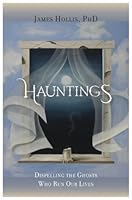
## Metadata
- Author: [[James Hollis]]
- Full Title: Hauntings
- Category: #books
## Highlights
- Our ego, in service to understanding and the need for control, converts the elemental processes in life into nouns. We foolishly convert even “the gods” into nouns, into objects “up there,” looking down, rather than metaphors for the autonomous, mysterious energies of the universe. ([Location 228](https://readwise.io/to_kindle?action=open&asin=B00E0L84BC&location=228))
- Jung observed that the greatest burden the child must bear is the unlived life of the parent. That is, wherever the parent is stuck, the child will be similarly stuck and will spend his or her life seeking to overthrow such noxious stuckness, evolving an unconscious treatment plan whose purpose is to assuage the pain of the psychic burden of this static past. ([Location 284](https://readwise.io/to_kindle?action=open&asin=B00E0L84BC&location=284))
- The present is haunted by the archetypal dynamics which remind us that any story untold is an unconscious present. An unconscious present is a story which will insist on being told and will spill into our biographies. ([Location 430](https://readwise.io/to_kindle?action=open&asin=B00E0L84BC&location=430))
- If I can learn from my direct encounter with mystery, if I can feel myself moved by the energies of the universe, and am haunted by them when I ignore them, then why not live my life according to what I have learned directly, rather than what is mediated by others, however sincere their motivation may be? Some distrust such splintered revelation, even consider it the route to madness, and flee encounters with the invisible energies that in fact course through us on a continuous basis. Is it not a paradox that the chief practical function of so many religious organizations is to protect people from religious experience? ([Location 638](https://readwise.io/to_kindle?action=open&asin=B00E0L84BC&location=638))
- For the initial years of our lives, the father is at times almost irrelevant, so bound is the child to his or her mother. But from about age six through twelve, the father provides the bridge out of the mother/child fusion and creates the necessary tension of the third. Without that third, the child remains bound to the mother. ([Location 822](https://readwise.io/to_kindle?action=open&asin=B00E0L84BC&location=822))
- As therapists, when we treat a man who can only express his sexuality when he is high, then we are most likely dealing with a parental inhibition, a complex, a constrictive or punitive message that separates this man from his nature. ([Location 847](https://readwise.io/to_kindle?action=open&asin=B00E0L84BC&location=847))
- Back when I was teaching in college I used to demonstrate a complex by walking into class and calmly saying, “Please take out a piece of paper and a pen.” While the request and its images are essentially banal, students' hearts would seize up and they would be flooded with anxiety. Why? Because who has not been threatened by surprise exams? While my sentence was quite ordinary, the history it activated was not. And beneath the level of the pop quiz anxiety lies a far deeper, archetypal need—the need to feel approved by the other, the need to feel safe, the need to be protected. All of this material is activated by this most ordinary of sentences: “Please take out a piece of paper and a pen.” Now we understand what a complex is, and how the present moment is always like a lily pad floating on a vast ocean of affect. ([Location 896](https://readwise.io/to_kindle?action=open&asin=B00E0L84BC&location=896))
- the cost of a burdening past is guilt, and the cost of an uncertain future is anxiety. Each affective state, guilt or anxiety, has the capacity to erode our participation in the moment and remove us from instinctual guidance in service to agendas of the past or anticipations of the future. ([Location 1362](https://readwise.io/to_kindle?action=open&asin=B00E0L84BC&location=1362))
- All of us have vulnerable spots in our armor, areas of personal vulnerability, and we are fortunate indeed if the fates do not bring us to those terrible places in our lives. All of us have some aperture where we are most frightened, least able to resist the rapid transport which every complex embodies out of this moment into dismal places past. ([Location 1390](https://readwise.io/to_kindle?action=open&asin=B00E0L84BC&location=1390))